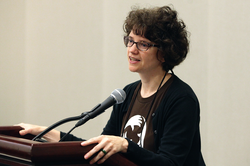Presbyterian Teaching Elder Mike McClenahan is a self-described evangelical with a simple message for Presbyterians who share his theological convictions: Immigration reform is needed now.
“A challenge for us as a church is to convince pastors like me who are evangelical that this is a biblical issue that must be addressed,” said McClenahan, senior pastor of Solana Beach Presbyterian Church in suburban San Diego. Evangelical Presbyterians, he said, have not been as active on immigration issues as more progressive Presbyterians.
McClenahan shared his commitment to immigrant rights during Wednesday's 221th General Assembly (2014) meeting titled Immigration and the Church that was sponsored by the Office of the General Assembly’s Office of Immigration Issues. More than 50 people attended the event.
His advocacy for immigration reform began with no small amount of trepidation, he said. While his congregation had been involved in ministries with Spanish-speaking people for years, McClenahan said diverse political opinions in his congregation made him shy away from involvement in the public square.
That all changed last year after two people spoke to his congregation about immigration. One was an immigrant named Pedro who told his life’s story. His story inspired the congregation to break out in sustained applause. The other speaker was retired Fuller Theological Seminary President Richard Mouw, who preached a sermon on Psalm 146 and its promise that “the Lord watches over the foreigner.”
“I just decided to say ‘yes’ to what God was calling me to do,” McClenahan said. His passion for immigration reform led him to write an article on the subject for the San Diego Union-Tribune. The article was noticed by a White House staffer, and that resulted in an invitation to a meeting President Barack Obama was having with evangelical leaders about immigration reform.
“What’s been most compelling for me has been hearing stories from people in our community and how our broken immigration system forces people into the shadows,” McClenahan said in an interview Wednesday. “They need to be recognized as contributing members of our community who want to fulfill their God-given purpose and contribute their God-given gifts.”
During the gathering, Teresa Waggener, PC(USA)'s coordinator of immigration issues, said Congress’s failure to approve comprehensive immigration reform has caused great disappointment for immigration reform advocates.
While stressing that immigration reform on the national level is the ultimate goal, Waggener said work on local immigration issues is also needed. She said Presbyterian immigration reform advocates are starting to network to share what they have learned in their communities. An overture to give denominational recognition to the newly formed Presbyterian Immigrant Defense Network was approved by the General Assembly Wednesday as part of its consent agenda.
“We need to get together to learn about what each other is doing and work together for positive immigration reform,” she said. Such efforts, she added, can “ameliorate the frustration while we are waiting” for Congress to act.
Waggener said she has seen some hopeful signs. She cited recent actions in Florida and Virginia that have made undocumented immigrants eligible for instate tuition rates to attend colleges and universities. According to the National Conference of State Legislatures’ website, 18 states allow instate tuition rates for undocumented students.
Howard Dotson, a teaching elder from the Presbytery of Nevada, said Presbyterians from across the country need to work together in localities where ordinances targeting undocumented workers have been passed or are being considered. He noted that such measures have created enmity toward Latinos. He pointed to Fremont, Nebraska, which has an ordinance prohibiting landlords from renting to undocumented people. “In Fremont, they were throwing beer cans and spitting in the faces of Latinos,” he said.
Immigration reform advocates, Waggener acknowledged, can face difficult situations. “It can be incredibly frustrating to be an advocate so we need to hold each other up and support one another,” she urged.

